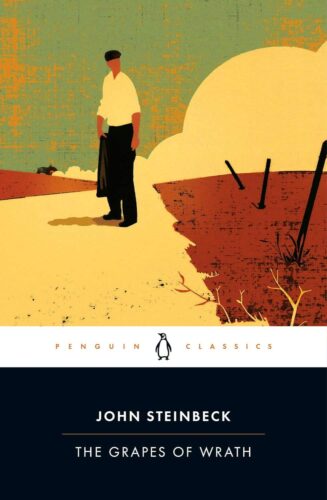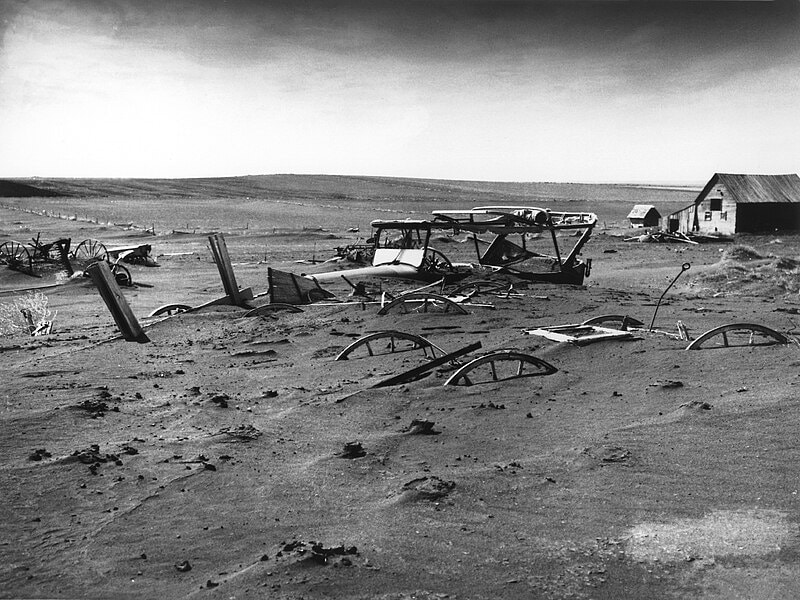 A Nihilistic Classic
A Nihilistic Classic
Author: John Steinbeck
Tom Joad, convicted murderer, is walking the long, dusty road to his Oklahoma home. He doesn’t regret what he did – he would do it again. But he does miss his family and wonder what happened to them while he was in jail. What he finds, after teaming up with an ex-preacher (Casey) on the road, is his family preparing to abandon their only home, the farm that has been with them for generations. It seems that there is hope, there is money, to be made in California. The government is taking over the farms, the banks foreclosing, the farmers losing everything. Everyone is leaving for this promised land, to pick fruit in California, to start again. The Joads are no exception. Tom and Casey join them, and the long, brutal journey begins. But at the end of this rainbow, there is only more hardship.
The Grapes of Wrath is a polarizing book. It’s important for posterity, for the American story, in that it reveals the history of the depression, of the Dust Bowl, the corruption of governments and financiers, the brutalities endured by the marginalized farmers, and the lies that destroyed lives for the sake of profits. It’s also filled with unsympathetic, selfish characters, demarcated by their grit and lack of education, huddled together in an amorphous, unfeeling blob. The Joads deserve what they get, but the real people this happened to – the desperate families hitting the road in old jalopies and risking their lives during the 30s for a lie – that’s another story; one that is actually better told in Kristin Hannah’s The Four Winds.
The Joads, for all the horrors they witness, are a surprisingly unfeeling lot. When we meet them, before the true awfulness has even begun, they are numb, sardonic people whose only reaction to death might be a slight chuckle, a shuffling of dirty feet in the road, and a snide comment. Their lack of feeling, of empathy even for one another as a family, is directly off-putting. I soon hated them.
Joad shows no sympathy for murdering a man over a bar fight. No one shows much sympathy when the grandparents die. The children think the family dog being run over, guts strew across the road in front of their eyes, is both amusing and a bit interesting, Rose of Sharon (the

United States Department of Agriculture image taken in 1936 of, Dallas, South Dakota (Public Domain)
pregnant daughter) thinks only of her pregnancy, and Casey, the ex-preacher, spouts blasphemous hatred for God while at the same time bragging about how he took advantage of young girls during his time as a preacher. And let me put it into perspective – Steinbeck clearly wants us to like Joad and to see this preacher as some sort of wise man. These characters aren’t created to be un-sympathetic and inhumanely cold. But they are, and it stifles the enjoyment of a story that should be moving.
Where the narrative does have power is in the history, the horrible Joads aside. Steinbeck recreates the atrocities of this era, of what was done to these people, from the government takeover of lands held for generations to the overpriced selling of junk cars, to the places of work in California that made sure a family could never get ahead, to the blatant printed lies, to the only escape being booze and ultimately death. This then, this capturing of history, this overarching approach that goes beyond the Joads to pull back the curtain on a sordid and shameful part of our collective story, is where the narrative’s power lay. There is also an undercurrent of “those who do not learn from history are doomed to repeat it,” which is, in my opinion, why this book has classical status. It’s certainly not because of the characterization.
Despite the merits, however, there are other books out there that cover this time better. These books call to the emotions more powerfully by creating empathetic people and showing how the horror of the Dust Bowl era felt from a personal level. Honestly, I’m not a fan of Steinbeck’s work because of this deadness of feeling, this blatant nihilism shown through hateful characters. I see why The Grapes of Wrath is a classic, and why it should be read, but the impact it makes is purely intellectual, missing the emotional component that should resonate poignantly in such a story.
– Frances Carden
Follow my reviews on Twitter at: https://twitter.com/xombie_mistress
Follow my reviews on Facebook at: https://www.facebook.com/FrancesReviews
- Book Vs Movie: The Shining - April 6, 2020
- Thankful For Great Cozy Mysteries - December 13, 2019
- Cozy Mysteries for a Perfect Fall - October 20, 2019


